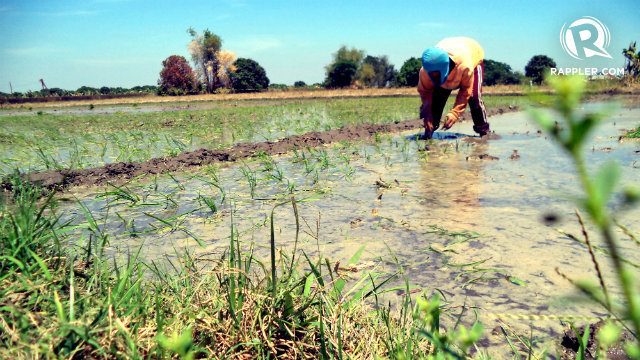SUMMARY
This is AI generated summarization, which may have errors. For context, always refer to the full article.

MANILA, Philippines – One would expect a booming agricultural sector in a country rich with vast fertile lands, but this seems to be not the case in the Philippines.
According former budget secretary Benjamin Diokno, the government should focus on the agricultural sector which employs a third of the labor force. (READ: PH agriculture: Why is it important?)
“It is cheaper to create jobs in agriculture than in other sectors,” he told Rappler.
In addition, pushing for the sector’s development will lead to inclusive growth, especially as agricultural workers are the poorest in the labor sector. (READ: The state of agriculture, fisheries under Aquino)
“Agricultural growth in the last 5 years was anemic,” Diokno stressed. “If you pay attention to agriculture in the rural area, that’s growth inclusive.”
Data from the Philippine Statistics Authority show that there is no significant change in poverty incidence among farmers.
| YEAR | POVERTY INCIDENCE |
| 2006 | 38.5% |
| 2009 | 38% |
| 2012 |
38.3% |
What can be done
In a forum organized by Greenpeace Philippines, Nheden Sarne of the Agricultural Commodities Division of the National Economic and Development Authority said there are a lot more improvements needed before the country’s agricultural sector achieves its full potential.
While the bulk of the programs of the Department of Agriculture (DA) are commodity-centric, Sarne suggested that it would be better if policies and projects will also focus on priority areas that can boost the stability of the sector.
1. Encourage investments in agriculture that promote area-based development
By ensuring that each area in the Philippines is prioritized through specific development programs, there will no longer be a problem of getting left behind. Each aspect will be tapped, leading to inclusive agricultural growth and eventually, economic growth.
2. Prioritize investments that can increase and sustain productivity
If the productivity of those working on the agricultural sector is developed, a lot of opportunities will open that can ensure growth. However, productivity enhancement should not only be on one or two aspects – it should cover the entire supply chain from production to marketing.
3. Ensure well-functioning irrigation systems and an efficient transport infrastructure
Irrigation systems have been a constant problem of the average Filipino farmer. If investments in a developed irrigation system is prioritized, it will make a huge difference.
Underscoring its important Sarne, noted that an improved irrigation system in any part of the Philippines can increase productivity by 15% to 20%.
4. Invest in programs that will increase resilience to climate risks and disasters, as well as pests and diseases
Farmers used to just face off with pests and diseases, and periodic typhoons, but as years passed by, climate change has contributed to the burden that hinders growth in the sector.(READ: How climate change harms the ASEAN food basket)
According to DA, farmers are the most affected by typhoons and other effects of climate change. Rehabilitation also takes time so developing resiliency is best.
Farmers should be taught on the various ways they can mitigate and reduce climate risks. If possible, climate-resilient crops should be made available. (READ: Empowering farmers against climate change)
5. Promote greater private sector investments and support
Connection with the private sector can be made through agri-business schemes such as contract farming.
The Food and Agriculture Organization (FAO) defines contract farming as “agricultural production carried out according to an agreement between a buyer and farmers.” Conditions then are set between the two parties regarding certain aspects such as quantity of crops to be produced.
The FAO added that both farmers and private institutions can benefit from contract farming.The farmers are guaranteed buyers of a specific quantity of their crops. Meanwhile, the private institution will then have adequate supply at agreed-upon price.
Reforms needed
Beyond programs that aim to uplift the current situation, Sarne suggested revisiting certain agriculture-related policies revisited to test their effectiveness. If proven to be ineffective, these should be reconsidered or at least, revised.
One of these laws include Republic Act 8178, or the Agricultural Tariffication Act.
“Dapat may close monitoring na maayos pagdating sa importation ng agricultural products,” Sarne stressed. “Hindi iyong import lang nang import; dapat maayos ang proseso rin.”
(There should be close monitoring when it comes to importation of agricultural products. there should be a proper process, not just always importing.)
In addition to land and water reforms, Sarne also encouraged reforms at the National Food Authority.
He said the NFA should maximize the productivity of the local farmers by increasing domestic palay procurement. The NFA’s role should also cover buffer stocking or ensuring a vast supply of rice.
Prioritize farmers
At the end of the day, the welfare of farmers should be kept in mind when implementing agriculture programs and projects. They are, after all, the country’s main food producers.
“Ang mas importante siguro na sa hanay ng mga farmers ay ma-diversify at increase ang kanilang sweldo,” Sarne said. “Sobrang maliit po ang sweldo para masustentuhan ang pangangailangan ng isang pamilya na pagsasaka lamang ang kabuhayan.”
(What’s more important is that we increase and diversify the income of farmers. Their income is very small and definitely makes it hard for a farming family to make ends meet.)
Being a country with rice as a staple, we cannot afford to lose our farmers. Their unproductivity can lead to a problem of food insecurity.
“May magugutom talaga kapag di masigla ang agriculture mo (There will really be hungry people if the agricultural sector is weak),” Diokno stressed. – Rappler.com
Add a comment
How does this make you feel?
There are no comments yet. Add your comment to start the conversation.